If we talk about lithography machines used to manufacture processors, we have to talk about ASML, a Dutch company that for many years has become the rival to beat of companies that also want to get into this process and that. because of its importance in the industry, it is prohibited from selling its most advanced machines to China.
ASML is the most advanced company in the field of nanoimprint lithography machines for semiconductor manufacturing; these machines have a very high price and energy consumption. Canon, known for its range of cameras, lenses, printers and healthcare equipment, has been working for many years on new nano-printing technology that could change the current competitive landscape since, according to the Financial Times, their price is 40% lower than that of ASML. Machinery.
Canon’s nanoprint technology
Additionally, they also reduce energy consumption by up to 90% compared to models from this Netherlands-based manufacturer. These two features could represent a turning point in processor manufacturing and democratize chip manufacturing. Canon specifies that the launch of the first machine would be planned for the end of this year or the beginning of next year.
This new Canon machine does not use a light-based engraving system like ASML but is based on stamping chip designs onto silicon wafers, at a much lower cost. Canon’s nanoprinting machines, as can be read in the interview that the director of Canon’s industrial group, Hiroaki Takeishi, gave to the Financial Times, will have a node width of 5 nanometers and could eventually reach 2 nanometers , but they will do so have not been pursued, so they are not initially designed to make next-generation processors but other types of components such as memory chips.
The ASML company has benefited from the financial support of Intel, Samsung and TSMC to create the lithography machines that this company has and the 3 companies currently have the most advanced machines from this manufacturer. Due to the high cost of developing this type of machine and not having the support of large companies, Canon took it very calmly, but relentlessly, until creating a machine that, according to all that she seems to indicate, will be able to compete with ASML models
The technology Canon uses to make the chips in its machines has improved significantly in recent years. reduce error rate considerably, so in theory everything indicates that they will be an alternative to the ASML line of machines in every sense. Canon, based in Japan, is another of the countries to which the United States suggests not selling this type of lithography machines to manufacture processors, a problem of which the company is aware and which represents an important limitation for sales of these machines.








